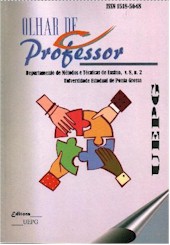Do percurso de formação e desenvolvimento profissional: entre normas e (pre)conceitos para repensar a profissão docente
Main Article Content
Abstract
O texto apresenta uma breve sistematização de aspectos conceituais que vêm norteando o percurso da formação e desenvolvimento profissional dos professores, com base nas diretrizes recentes elaboradas pela política educacional brasileira e no movimento dos educadores frente às tensões e desafios que foram desencadeados a partir dessas diretrizes. Sob essa perspectiva, o estudo retrata o contexto de formação docente, assinalando, do ponto de vista social e profissional, quais foram as mudanças mais significativas por que passaram e passam os professores. Ao denunciar os limites da real política de formação e profissionalização, este texto levanta considerações para repensar o compromisso do Estado e da Escola com o estabelecimento de políticas, assim como indica a necessidade de se valorizarem estratégias de aprendizagem da profissão, que permitam descortinar um percurso profissional de construção e de produção de sentido no conjunto das diretrizes propostas e das práticas educacionais.
Downloads
Article Details
Authors who publish in this journal agree with the following terms:
a) Authors keep the copyrights and concede the right of its first publication to the magazine. The work piece must be simultaneously licensed on the Creative Commons Attribution License which allows the paper sharing, and preserves both the author identity and the right of first publication to this magazine.
b) Authors are authorized to assume additional contracts separately, to not-exclusively distribution of the paper version published in this magazine (e.g.: publish in institutional repository or as a book chapter), with the author identity recognition and its first publication in this magazine.
c) Authors are permitted and stimulated to publish and distribute their papers online (e.g.: in institutional repository or on their personal webpage), considering it can generate productive alterations, as well as increase the impact and the quotations of the published paper.
d) This journal provides public access to all its content, as this allows a greater visibility and reach of published articles and reviews. For more information on this approach, visit the Public Knowledge Project, a project that developed this system to improve the academic and public quality of the research, distributing OJS as well as other software to support the publication system of public access to academic sources.
e) The names and e-mail addresses on this site will be used exclusively for the purposes of the journal and are not available for other purposes.

This work is licensed under a Creative Commons Attribution 4.0 International License.

